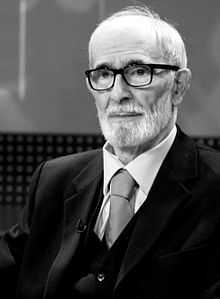Rexhep Qosja
| Rexhep Qosja | |
|---|---|
 | |
| Born |
1936 Vusanje, Kingdom of Yugoslavia |
| Occupation | Novelist, Poet, Social Critic, Literary Cirtic, Politician |
| Nationality | Albanian |
| Period | 1967-present |
| Literary movement | Postmodern literature, Literary Criticsm, Cultural Criticism |
| Notable work(s) |
Dialogue with Writers 1967 |
Rexhep Qosja (Montenegrin: Redžep Ćosja, Реџеп Ћосја) (born 1936 in Vusanje, Zeta Banovina, Yugoslavia) is a prominent Albanian politician and literary critic from a part of Malësia in modern Montenegro (where locally the region is known as Malesija). He holds a Bachelor's degree from the University of Pristina and had graduated with a Master's degree from the University of Belgrade Faculty of Philology in 1968.[1]
Qosja is author of various anthologies and scholarly monographs, including a three-volume history of Albanian literature in the Romantic period. He is also the author of the novel Vdekja më vjen prej syve të tillë ("Death Comes to Me from Such Eyes", Pristina, 1974).[2]
Qosja has been a pro-Albanian rights advocator for many years. He has written many books outlining the history and the struggle of the Albanian people in the Balkans for many years. Along with politician Hashim Thaçi, Qosja was a prominent figure in the peace talks to end the Kosovo War of 1999. With his superior knowledge and expert advice, Thaçi was able to rise in the ranks of the Kosovo government. He has criticized many prominent political figures in Kosovo and Albania for actions considered to be degrading to the Albanian people. Such figures to be criticized include Ismail Kadare, Ibrahim Rugova, Sali Berisha, Fatos Nano, Nexhat Daci, Bajram Kosumi and many Democratic League of Kosovo (LDK) party members. He also has criticized every one who was anti-Albanian progression, anti-Kosovo liberation, anti-Kosovo Liberation Army (KLA) and those people who did not fight for the liberation and recognition of the Albanian people and their rights.[3]
Qosja's brother Isa is a film director.
References
- ↑ "Rexhep Qosja - Biografia". Akademia e Shkencave dhe e Arteve e Kosovës. Retrieved 26 June 2012.
- ↑ Historical dictionary of Kosova by Robert Elsie, p. 147-148.
- ↑ Elsie p.147-148